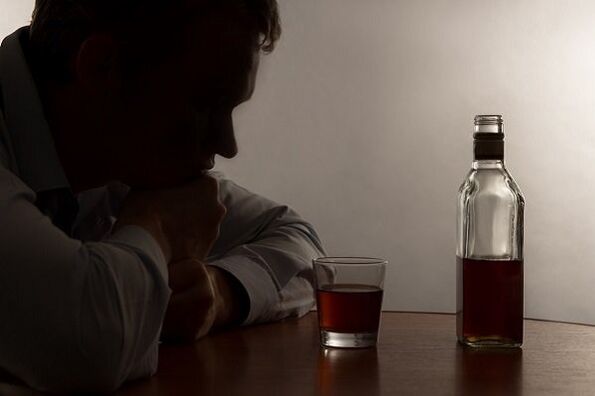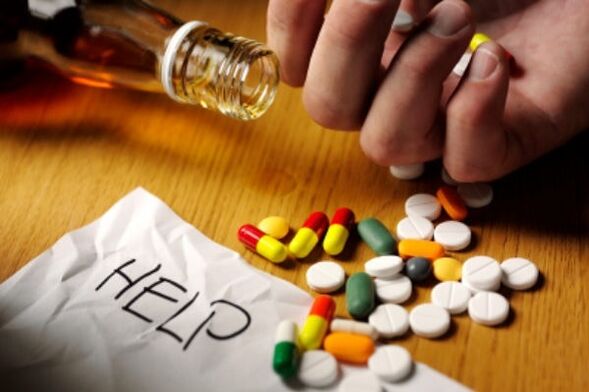People who drink and their loved ones believe that it is better and more right to quit drinking suddenly than to give up a bad habit step by step. Such a method is not equally effective for everyone, and then people ask how you can gradually stop drinking with minimal damage to health?
Is it possible to quit drinking suddenly?
Intoxicated people who suddenly decide to give up alcohol often fail and return to their addiction. In addition, alcohol dependence is exacerbated as the body abruptly stops taking ordinary ethanol and tries to keep it for future use.
People who drink for a long time are so accustomed to the effects of alcohol on the body that a sharp refusal does not make them feel uncomfortable, but also binds them more to the bottle when they break. In addition, such attempts to break free from addiction often affect and exacerbate a person's physical and mental health. Again, alcoholism is not a desire to drink, but an addiction that occurs on several levels and its sudden withdrawal leads to catastrophic consequences.
It is important!If the addiction lasts less than a year, it is possible to suddenly give up alcohol.

People with long-term alcoholism will not be able to give up the "green snake" once and for all. Their disposal should be gradual and ideally under the supervision of a narcologist. This is due to the fact that the sharp rejection of the habit can exacerbate chronic diseases, the emergence of previously non-existent mental problems. To prevent negative feelings of rejection from recurring, it is necessary to use the technique of gradual abstinence instead of supervision by doctors, support from relatives and friends, and abrupt separation from addiction. Tools that are freely available on the Internet also help.
What changes will take place in the body
Feelings can be subjectively unpleasant after the first cessation of alcohol. This is due to the negative effects of ethanol on the body and the fact that a drunk person has not yet recovered.

In the first few weeks after giving up, a person may experience accidents, frequent illnesses, and depression. Such a reaction is explained by a decrease in immunity and the fact that the body has not yet adapted to the new conditions and is trying to return everything to normal. People tend to re-hold the bottle during this period, convinced that it is better than being constantly sick.
It is important!First of all, there must be people who can give psychological support to the former alcoholic and explain that his health will return to normal as soon as the body is completely free of toxins.
When the crisis is over and the body heals, the former drunk will feel better and will even be able to notice it. Improvements:
- increase the body's defenses;
- improving the condition of the skin;
- improve memory;
- stability in the work of the heart and blood vessels;
- normalization of digestive and urinary processes.
As soon as they stop drinking, their general condition does not improve immediately. The body needs some time to fight addiction. You need to remember this and not expect quick results.
Alcohol withdrawal syndrome
Drunkards often refer to the fear of abstaining from alcohol when defending their desire to drink. What is it and how to stop drinking alcohol to prevent the development of these unpleasant complications?
Withdrawal is a normal reaction of the human body to a sudden rejection of something. In the case of alcoholism, primarily delirium manifests itself in a dangerous condition such as tremens.

Delirium tremens is characterized by a person losing control of themselves a few days after giving up drinking. In this case, the following symptoms may appear:
- insomnia;
- panic attacks;
- hallucinations;
- rave.
In such a state of psychosis, a former alcoholic poses a serious threat not only to himself but also to those around him. Symptomatology develops mainly in the evening and morning, the person is calm during the day and night.
Alcoholic psychoses have been shown to develop mainly in people who have been drinking alcohol for a long time and who suddenly quit.
Withdrawal syndrome rarely develops with the gradual abandonment of regularly consumed harmful products. This is another reason to tie the "green snake" step by step.
Gradual failure is the key to success
If you drink for a long time and can no longer imagine yourself without a glass of beer or a glass of vodka, doctors advise to seek special help. The narcologist, realizing that such a patient has a problem, will give advice on the gradual rejection of alcohol.
Gradual withdrawal is the best option for chronic intoxicated. At the same time, it is possible to combine different treatment methods for addiction, from medication to psychotherapy sessions.
Gradual failure consists of several stages.
- First, one must accept the existence of a problem and be prepared to deal with it. This is one of the most difficult stages, because alcoholics often do not consider themselves ill with anything.
- Second, you need to overcome your pride and consult a doctor. This stage can also be difficult for an addict, as it means acknowledging the weaknesses they face.
- Third, we need to start a struggle consistently and gradually. To do this, you need to follow the doctor's advice, avoid alcohol companies, and radically change your attitude to life.

If a person gradually stops drinking, they are more likely to overcome their addiction once and for all. In this case, the body is able to adapt to change, get rid of accumulated toxins, form new positive habits to replace the old ones.
Gradual abstinence from alcohol is an option for people whose addiction has already reached a chronic stage, when it is impossible to quit without drinking. In order to get rid of an addiction in such a way, you will need medical advice, a positive attitude and perseverance, and the support of your loved ones. The more responsible a person is about the need to stop drinking, the more likely he or she is to succeed.































